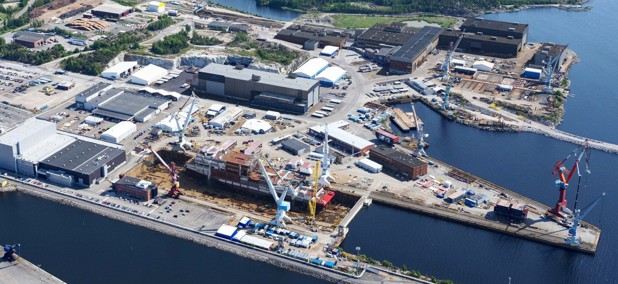World
Trump’s Icebreaker Deal Sparks Concerns Over U.S. Shipbuilding

The recent agreement between President Donald Trump and Finland regarding the production of U.S. Coast Guard icebreakers has raised significant concerns about the future of American shipbuilding. On October 9, 2023, Trump signed a memorandum of understanding that allows for the first four icebreakers to be built in Finnish shipyards, followed by seven others to be constructed in the United States. While this deal aims to bolster the U.S. Coast Guard’s capabilities, it also poses risks to the domestic shipbuilding industry.
Jerry Hendrix, who leads the White House Shipbuilding Office, praised the agreement as a demonstration of Trump’s negotiation skills. He suggested that similar arrangements could be made for the construction of U.S. Navy warships. Critics, however, argue that outsourcing critical naval production undermines the long-term goal of a robust American maritime industry. They contend that the ability to build a fleet domestically is crucial for national security and strategic independence.
The historical context of U.S. naval victories underscores the importance of maintaining a strong shipbuilding base. During World War II, the U.S. Navy’s success at the Battle of Midway was largely attributed to the ability to replace lost ships quickly due to a thriving domestic shipbuilding sector. Today, however, the situation is markedly different, as the American maritime industry has experienced significant decline since the 1980s and 1990s, when government support for commercial shipping and shipbuilding was reduced.
Trump’s deal with Finland may inadvertently set a precedent for further outsourcing that could jeopardize ongoing efforts to revitalize U.S. shipyards. The Maritime Statecraft strategy, which emphasizes investment in American shipbuilding by allied nations, has already seen positive developments. For example, South Korea’s Hanwha purchased the Philly Shipyard and plans to invest $5 billion to modernize its facilities and increase output. Similarly, Davie Shipbuilding from Canada intends to acquire a Texas shipyard to enhance its capabilities in the U.S.
While these investments signal a promising direction, the icebreaker deal complicates the landscape. Outsourcing naval construction could deter foreign shipbuilders from making long-term commitments to U.S. facilities. If the U.S. government opts to send contracts overseas, it diminishes the incentive for these companies to invest domestically. Critics posit that a more strategic approach would require foreign shipbuilders to complete their contracts in the United States through their new American subsidiaries.
The potential fallout from this agreement extends to upcoming diplomatic engagements as well. As President Trump prepares for a summit in South Korea, where he aims to solidify a trade agreement, the implications of the icebreaker deal loom large. During recent tariff negotiations, South Korea proposed a significant investment strategy, offering $150 billion in loans to encourage South Korean firms to invest in the U.S. shipbuilding industry without requiring outsourcing. This approach aligns with existing U.S. laws that mandate domestic construction of warships.
Trump’s current agreement with Finland raises concerns that it could undermine this broader strategy, potentially jeopardizing the opportunity for South Korean investment in American shipyards. The situation is precarious, as the administration may face pressure to outsource more shipbuilding in the future, which could ultimately harm the U.S. maritime industry.
In conclusion, the decision to outsource the construction of icebreakers may yield short-term benefits, but the long-term consequences could be detrimental to American shipbuilding. Maintaining a robust domestic industry is essential for national security and economic stability. As the Trump administration navigates these complex negotiations, prioritizing American shipbuilding over outsourcing will be crucial for ensuring a strong maritime future.
-

 Science2 weeks ago
Science2 weeks agoResearchers Challenge 200-Year-Old Physics Principle with Atomic Engines
-

 Politics2 weeks ago
Politics2 weeks agoNHP Foundation Secures Land for 158 Affordable Apartments in Denver
-

 World4 days ago
World4 days agoBoeing’s Aircraft Production: Assessing Numbers and Challenges
-

 Entertainment3 days ago
Entertainment3 days agoSyracuse Stage Delivers Lively Adaptation of ‘The 39 Steps’
-

 Lifestyle4 days ago
Lifestyle4 days agoRed Bluff High School’s Elli Nolan Named Rotary Student of the Month
-

 Health2 weeks ago
Health2 weeks agoNeuroscientist Advocates for Flag Football Until Age 14
-

 Lifestyle2 weeks ago
Lifestyle2 weeks agoLongtime Friends Face Heartbreak After Loss and Isolation
-

 Science3 days ago
Science3 days agoAI Misidentifies Doritos Bag as Gun, Triggers Police Response
-

 Business2 weeks ago
Business2 weeks agoSpirit Airlines Cuts Workforce with Furloughs for 365 Pilots
-

 World2 weeks ago
World2 weeks agoGlobal Military Spending: Air Forces Ranked by Budget and Capability
-

 Top Stories4 days ago
Top Stories4 days agoUrgent Search for Suspect Who Exposed Himself to Teen Girl
-

 Politics2 weeks ago
Politics2 weeks agoIsraeli Air Strikes in Lebanon Kill One, Wound Seven Amid Tensions









